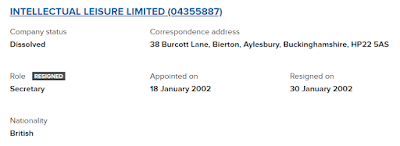This might help explain a couple of things, one of which1 might be the deterioration in quality of the 2017 accounts in particular, perhaps best illustrated by the fantastic upside-down, back-to-front page that appears there, giving the impression that whoever submitted them didn't really know what they were doing.
Other examples, of various kinds, include the section numbers skipping from 14 to 16, missing out 15
the retention of an x where there ought to be a specific figure
and a failure of arithmetic (it's £90,333).
Or from the latest accounts, year ending 31 March 2018, there's an inability to get the name right of one of the grant-receiving entities
and getting the wrong date for Eric Schiller's death (it was 3 November). Really you'd think they'd get that right.
But this kind of carelessness is of course a Ray characteristic. It might also be the sort of thing a professional would put right before approving and submitting the accounts. So why deprive yourself of their useful services? One possible reason might be the difference in remuneration due to the Independent Examiner, which hopped up to four grand in Blick Rothenburg's last year
and then hopped down.
Another possible reason might be that the new Independent Examiner, David Massey, doesn't just come cheap, but doesn't appear either to be independent, or to do any examination. Why would you care that all the major grants go to Ray's old friends and business partners, when you're one of them?
So who's David Massey? As I wrote last September, he seems to be
the same David Massey who was CEO of Brain Games Network all those years agoand who gets a couple of mentions apiece in two of David Levy's pieces on the subject.
This was, shall we say, a controversial period. In The Big Book of World Chess Championships (New In Chess, 2016) Andre Schulz summarises thus:
So what's Mr Massey doing now, apart from picking up a grand from the Brain Trust every year in return for not very much? He's the sole director of a company called Bordelais Investments Ltd which was incorporated five weeks or so ago and has as its registered office address 1 Charterhouse Mews, London, Greater London, United Kingdom, EC1M 6BB
which is something of a coincidence, as somebody else moved their registered office address to somewhere very similar the day before.
Massey's directorial record also shows this oddity: he was a director of a company called Intellectual Leisure Limited for twelve days in January 2002.
I wonder if you can guess who else was a director of a company called Intellectual Leisure Limited for the same twelve days in 2002?
Course you can.
Naturally one wonders whether those twelve days were related to the transfer of marketing rights referred to by Schulz here.
At any rate, the point, for our purposes is that the Independent Examiner2 of a charity's accounts is probably not, ideally, somebody who has a business history with the leading trustee of that charity, nor somebody whose registered office address and that charity's registered office address are the same.
Unless you didn't want any independent examination done. Then it's exactly who you'd want, isn't it?
- - - - - - - - - - - - - - - - - - - - - - - - -
1 Another is the sudden increase in the figure below which donations are not identified, from one thousand to five thousand pounds.
2 Accounting for charities is governed by the Statement of Recommended Practice (SORP) FRS 102, where FRS stands for Financial Reporting Standard. Guidance for Trustees is at CC15d Charity reporting and accounting: the essentials. Guidance for independent examiners is covered by CC32 Independent examination of charity accounts: Directions and guidance for examiners reinforced by the document Matters of Material Significance reportable to UK charity regulators.
There's an awful lot of wordage in these documents and if you try to work through them you'll inevitably get lost (though don't let me stop you!) but if it helps, it is perhaps worth drawing the reader's attention to the press release that accompanied the issue of the latest version of CC32, and this part in particular
and the one accompanying the issue of Matters of Material Significance
and also this from Matters of Material Significance.
It will be obvious not only that none of this has happened, but that it not happening has been the whole idea.


















2 comments:
To use a common phrase, Jesus wept
--theBlueWeasel--BlueBirdsOver
Nice Accounting firms in uk
Post a Comment